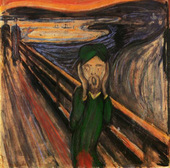|
That ended as expected, unfortunately.
|
|
|
|

|
| # ? May 24, 2024 07:35 |
|
Sad to see Elissa go but drat am thrilled to see where the LP will go
|
|
|
|
Good imo
|
|
|
|
Is the LP still alive or has it gone down the drain?
|
|
|
|
just on hiatus, I take a lengthy break whenever I get burnt out on Paradox games -- but I'll get back in the mood for them eventually these LPs take years anyways, so it's inevitable
|
|
|
|
|
hashashash posted:just on hiatus, I take a lengthy break whenever I get burnt out on Paradox games -- but I'll get back in the mood for them eventually Take your time. Your mental health is more important anyway so take all the break you need
|
|
|
 Part 11 — On the Black Sea — 925 to 1000 The fall of Seleucia… the breaking of Damascus… the sacking of Tyre… on all fronts and in every direction, the swords of Islam score victory after victory. There was still some vigorous opposition in Anatolia, Persia, Assyria, but by and large, it was looking like the great deluge that was Islam was destined to smother every nation and land on the earth.   The Caliphate has enacted the decision that ends the Struggle mechanics, on their terms. As far as the king of Pontus was concerned, however, the struggle was only just beginning.   A country of river valleys and shielding mountains, Pontus is situated on the shores of the Black Sea, hemmed in by the larger kingdoms of Armenia, Assyria and Galatia. The ruling class is Phoenician, but the cultural makeup is very diverse, comprising a mixed peasantry of Greeks, Armenians, Galatians. A small realm, but ambitious as well, just as its monarch was — despite his rather frail temperament, Gerbaal was as bold and stubborn as only a young king could be.  He knew all about the great Mohammedan Tyrant, of course; the populace of the Caliphate praised him and called him ‘Magnificent’; but to peasants and lords alike in Phoenicia, Assyria, Armenia and Persia, he was cursed and called ‘Wicked’.  He also knew about the queen of Tyre who had defied that Tyrant, and suffered a terrible invasion, defeat, and exile as a result — Elissa III, his grandmother on his (matrilineally-married) mother’s side.  Thus, on his father’s side, Gerbaal fostered dreams of expansion across the Caucasus, and on his mother’s side, Gerbaal inherited an enmity of the Caliphate. Before he could begin to pursue either of these ambitions, however, Gerbaal needed allies. The king of Pontus was born a Nasiad, but the Jews were now mere islands in the Abrahamic ocean that had flooded the Middle East, and Pontus was sitting squarely in between two large Christian sects — the Patristic Church in the west, and the Antiochene Church in the east.  So if Gerbaal was going to have any allies in the region, he had to make a decision — and in the year 930, he did just that, announcing his court and kingdom’s conversion to Patristic Christianity.   And immediately, this conversion began yielding benefits, with the Pope in Byzantion sending plenty of gold to fund an expansion of Pontus’ armies.  …really quite a lot of gold…  This was soon followed by a marriage pact between Gerbaal and Aucissa, a Galatian princess, sealing an alliance between the two kingdoms.   The marriage proved a fruitful one, with twin sons born just a year after their marriage, and a daughter in each of the five years that followed.  More importantly, however, the marriage also brought Galatia’s levies with it, and it was with this backing that Gerbaal launched into his first campaign — in the year 936, he led his own 3000 levies into the harsh, mountainous country of Kartli, accompanied by 8000 Galatians…  There, the allies fought and defeated the Armenians in two decisive battles, and seized the county of Acampse.   Of course — once defeated, there was no mercy to be shown. Over the next ten years, Pontus and Galatia embarked on regular invasions into Armenia, crushing the Antiochene kingdom in battle after battle, seizing county after county, until Gerbaal had come to control all of Sakartvelo, and even besieged the heartland of Armenia itself.   The king of Armenia dispatched a desperate plea for aid from nearby Antiochene realms, but the largest and wealthiest of them, Assyria, was facing a crisis of their own…   Dynastic intrigues in Assyria had exploded into civil war, which then led to a coup and the rise of a Sogdian dynasty to power, which in turn triggered a Caliphate invasion that, after a decade of fighting, had utterly shattered any semblance of order in the realm.   And by the year 950, the kingdom of Assyria was but a memory.  Gerbaal moved quickly, invading and seizing several border provinces to shore up his own defenses — with the king of Persia and lords of the Caliphate doing the same.    With his position at home so thoroughly entrenched, Gerbaal could finally look to more distant shores for expansion — Taurica, the so-called jewel of the Black Sea, rumoured to possess hidden wealths and fertile fields.   Enamoured by these rumours, the king of Pontus dispatched an invasion of the Taurican peninsula in 951, but the campaign met with ignoble defeat when a large band of Normans (who had seized the peninsula several years earlier) ambushed and annihilated the Pontine army.    Despite their victory, the harsh rule of these Normans provoked an uprising of native Greeks, Scythians and Huns, expelling the Norman invaders from the peninsula.  Eager to take advantage of such an opportunity, Gerbaal personally led another invasion of Taurica in 953, spending a year or so marching back and forth and crushing the roaming bands of Scythian and Gothic horsemen wherever he found them.   And by the end of 955, the entire peninsula had submitted to Gerbaal —  All the while, however, Gerbaal had one eye trained on the south — on the Caliphate. Through spies and diplomacy, threats and bribes, the secrets of the Caliph’s firearms began to leak out and into surrounding realms, and by 960, Gerbaal finally learned enough to train his own troop of firearm knights.   They were expensive, almost ruinously so, but Gerbaal was determined to build a force that could match his greatest enemies, and so he raised all the gold required to maintain these knights. This new troop was fully-armed and trained by the spring of 967, and Gerbaal immediately tested their mettle in a renewed campaign into Assyria — where they proved a magnificent success, with the horsed-and-armoured knights throwing lightning from the palm of their hands and burning down swathes of enemy levies in pitched battle, winning for Gerbaal and Pontus half a dozen provinces.  Unfortunately, however, the king of Galatia was killed towards the end of these campaigns— a stray arrow lodged in the eye, or so the histories claim — and his sons partitioned the once-formidable kingdom between themselves.  Concerned for the stability of the Patristic Church (and very aware of his wife’s inheritance rights), Gerbaal immediately marched his forces westwards...  But the Anatolian interior proved to be harsh and rugged, and infested with all manner of marauder and bandit. Gerbaal was nothing if not stubborn, however, and he campaigned across the width of Anatolia for almost two years, losing an arm and an eye along the way.    Stubborn, but successful as well. After a decisive 973 victory in battle across the straits from Byzantion, Gerbaal had his wife installed as queen of Sardis.   With that done, Gerbaal returned to Pontus to oversee his own realm. A long period of calm followed, several slow and prosperous years, with the war-weary king fixing his attentions on roads, ports, towns, building projects and trade networks — the stuff of peace.    He especially invested in the development of Taurica, seeing that peninsula as his own personal fief, whilst his conquests in Armenia and Assyria were delegated to cousins, sons, loyal retainers and so on.    Gerbaal still led his armies on campaign, of course — most notably in the pacification of Kartli in 985 and the conquest of the Gorgippian straits in 992 — but these were small-scale affairs that simply confirmed the dominance of Pontus in the Caucasus and around the Black Sea.   The king was saving his strength for an altogether greater foe: Islamdom. He waited for any weakness on the part of the Caliphate, any hint of frailty or fragility, anything at all — he would be ready to strike, swift and decisive, and return the sufferings of Elissa and Tyre a hundredfold. Before that fateful day could arrive, however, Gerbaal was struck by misfortune when his wife (and friend, confidante, lover) passed in her sleep at the very impressive age of 82.   This death was compounded by further tragedy, as his eldest son (and heir) perished in a duel in 984 and his twin brother (new heir) was slain during in a 987 raid into Armenia.    Gerbaal himself was an old man — 84 years of age by then —and these losses were simply too much for him to take. He died just a few months later, consecrated and buried in his Trebizond estates.  The legacy he leaves behind is colossal. Expanding the Pontine kingdom, revitalising the Elissid dynasty, spreading the Patristic creed — his deeds and accomplishments were many, and so he would be rightly remembered as Gerbaal the Great. hashashash fucked around with this message at 17:28 on Nov 10, 2023 |
|
|
|
|
Part 12 — INTERLUDE II Christian date: in the year of the Lord 1000 Islamic date: 390th year since the Hijra Carthaginian date: the year 1750 in Qart Hadasht A BRIEF LOOK AT THE WORLD As the century and millennium approaches its end, the world is a vast, roiling sea of peoples and gods, dynasties and wars, intrigues and schemes, great migrations and great movements.  Beginning at the distant edge of the world, the United Kingdoms of the Narrow Seas has collapsed into a cesspool of warring claimants, fracturing into its realms and suffering defeat against Britons in the north and Gauls to the south.   Their neighbours to the east have been similarly unfortunate, with the Sclaveni Kingdom losing ground to Gauls and then collapsing into a storm of constantly-warring Slavic warlords.  To their north, the Normans squabble with one another over the tinpot crown of the Romans.   While in Pretania there are three rivalled kingdoms of Irish (in Ivernia), Brytho-Punics (in Gergis) and Normans (in Normandy) struggling for supremacy of the island.  To their south, on the other hand, Spania has defeated the Vascons and Iberians in a string of battles that has cemented her place as the dominant power of that peninsula — despite these victories, the ruling Barcids have been overthrown, with democracy restored and the senators of Spania proclaiming themselves the true successors to Carthage. 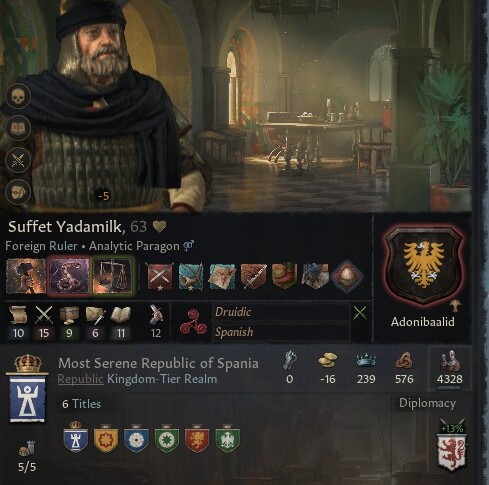 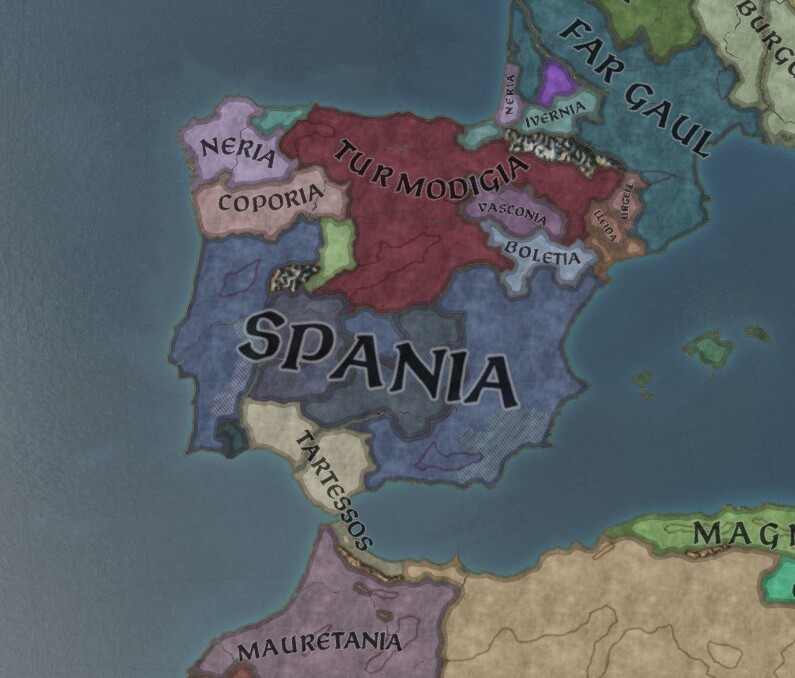 The rest of Europa is overrun with Germans — there are Teutons and Visigoths, Jutes and Goths, Lombards and Suebs and Franks, and half a dozen lesser realms, all having feudalised and settled into regular wars that has delineated their borders. The Germanic kings in the east have accepted Christianity, whilst those in the west still hold fast to pagan gods. 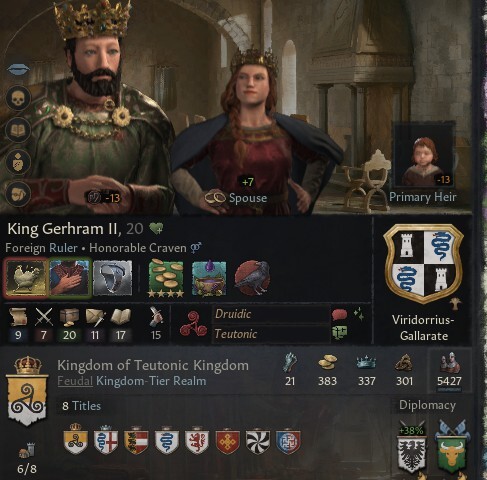 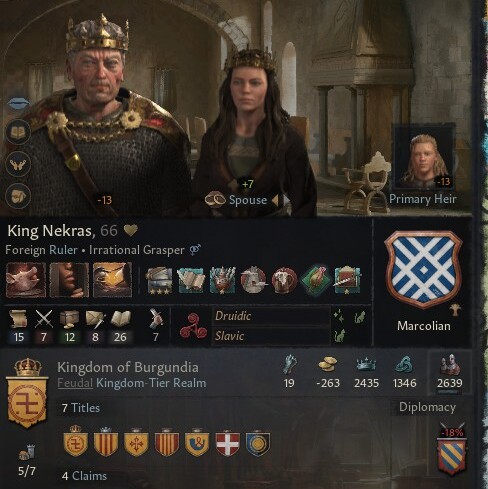 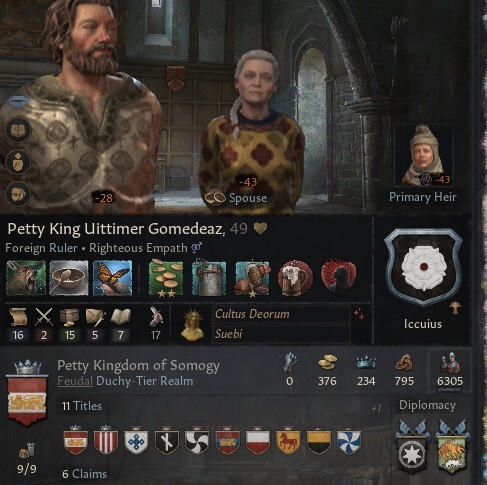 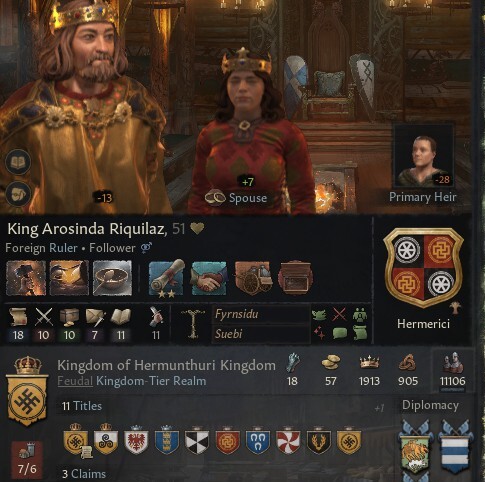 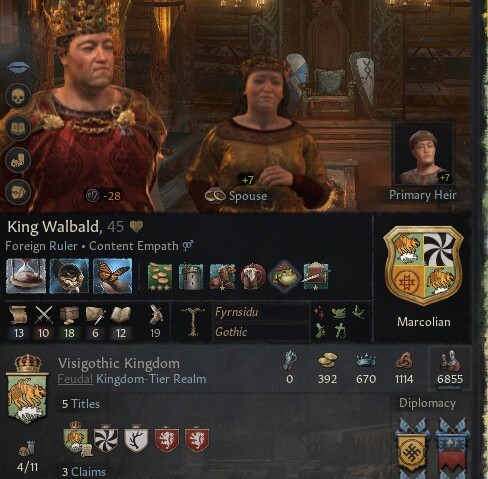 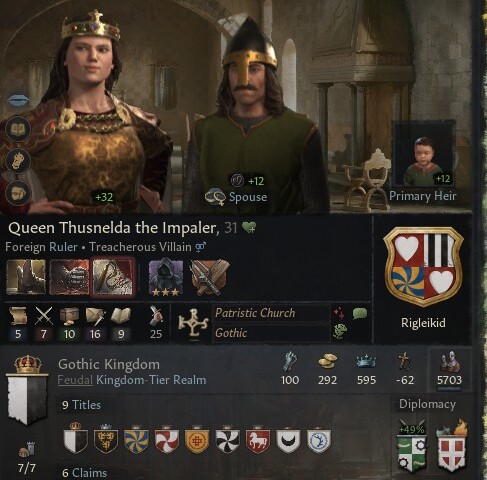 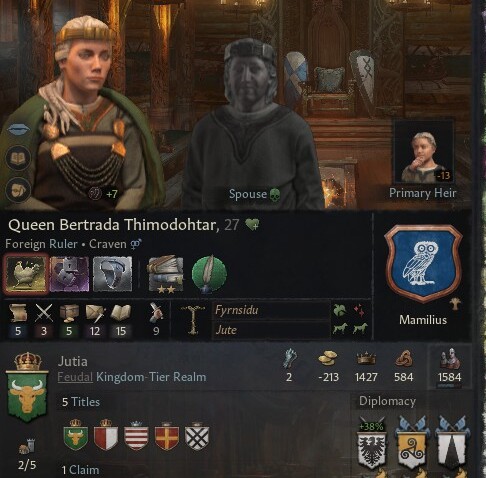 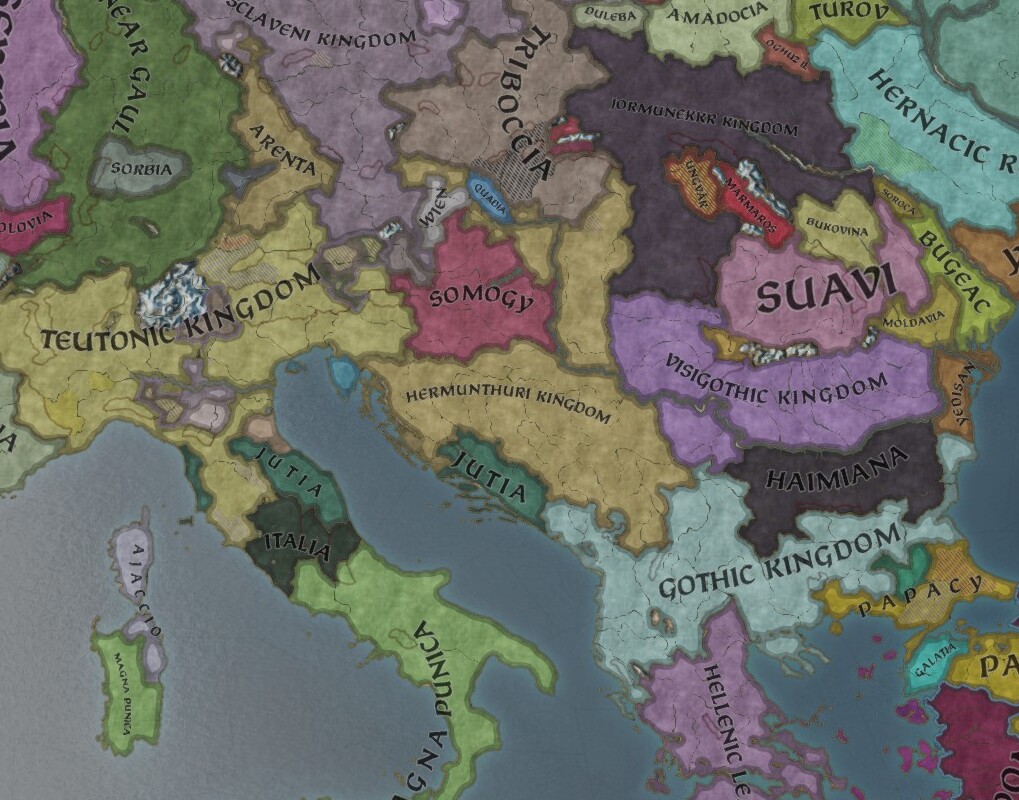 In the cradle of Carthage, meanwhile, there are two powers locked in the struggle to succeed the Ever-Shining City: the Punicized Berbers of Numidia on one hand (ruled by a distant Magonid relative), and the Muslim lord of Magna Punica on the other (controlling the actual city of Qart Hadasht). 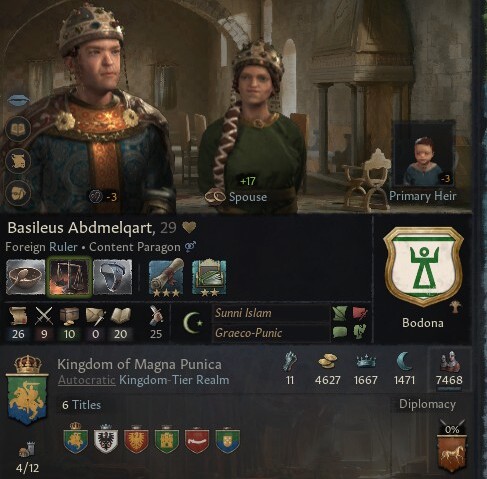 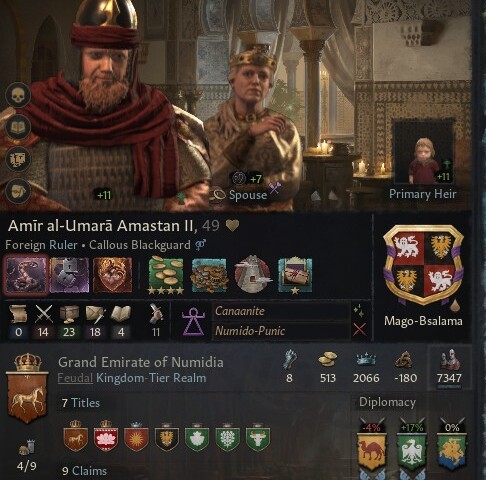 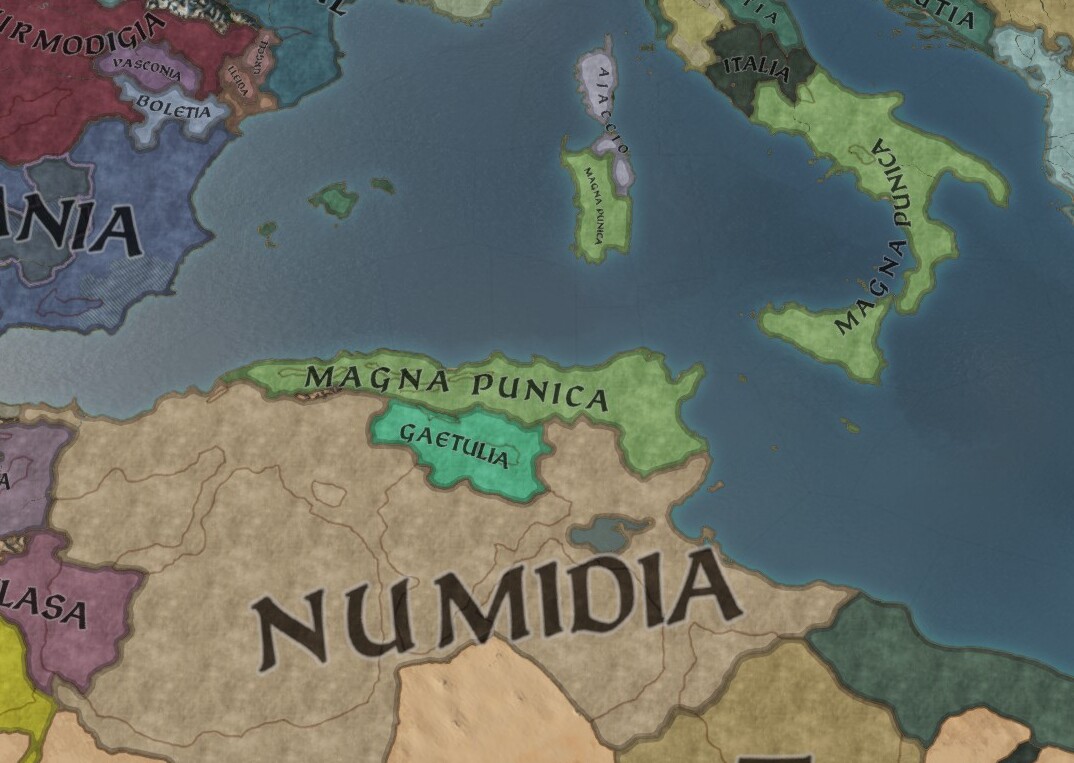 The Numido-Punics have also begun traversing the treacherous Saharan routes, setting up a state that has grown wealthy off the tolls and trade passing through their lands. 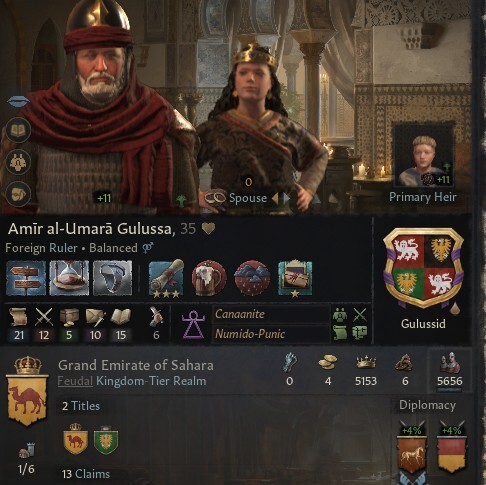 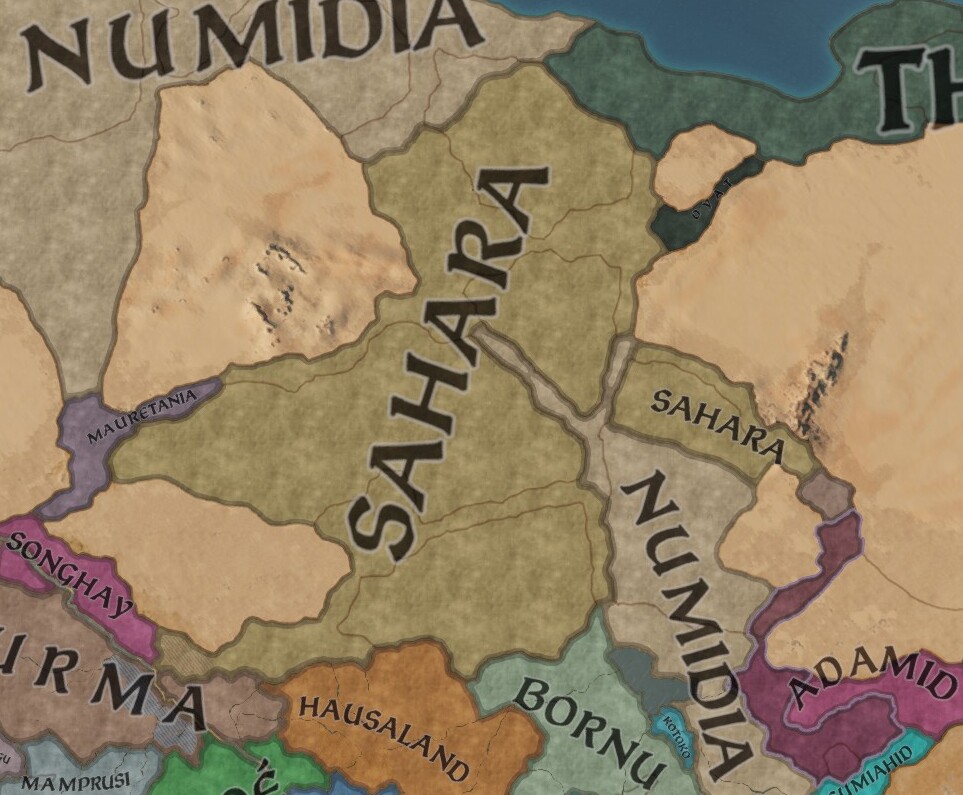 Threatening them all, however, is an unexpected force rising from behind the impassable swathes of the Great Desert — the gold-rich mansa of Mali, who has met with Punic merchants and followed their tales into the north, seizing the vital trade routes spanning the sands and invading the fertile country of Atlasa. Now, the mansa looks to the bickering heirs of Carthage with interest. 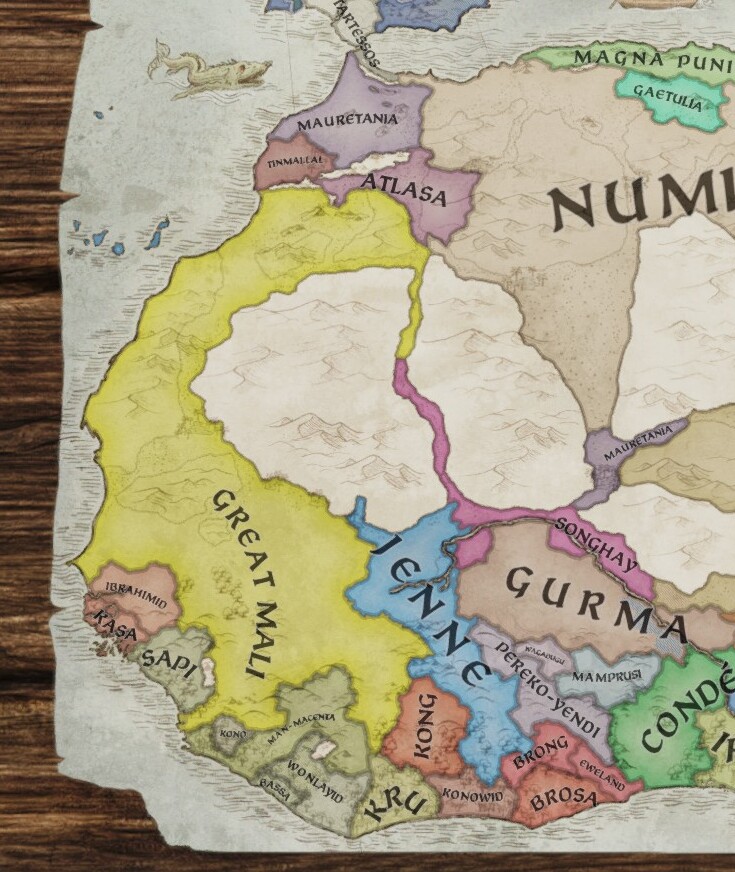 Sitting squarely in the midst of the chaos and carnage, the Hellenic League has managed to repel Germanic invasions and withstand Christian missionaries to maintain their Jewish faith and Republican ideals — a fossil of antiquity that, somehow, still survives, still prospers. 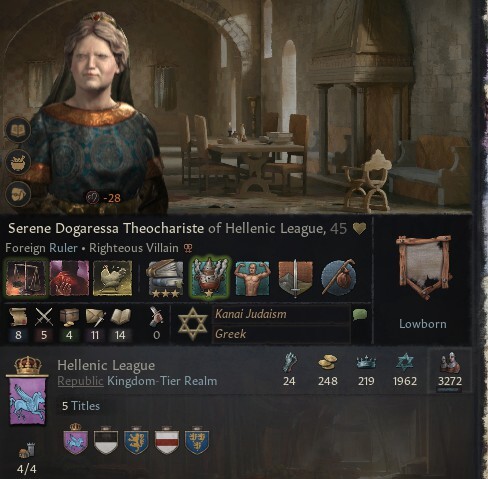 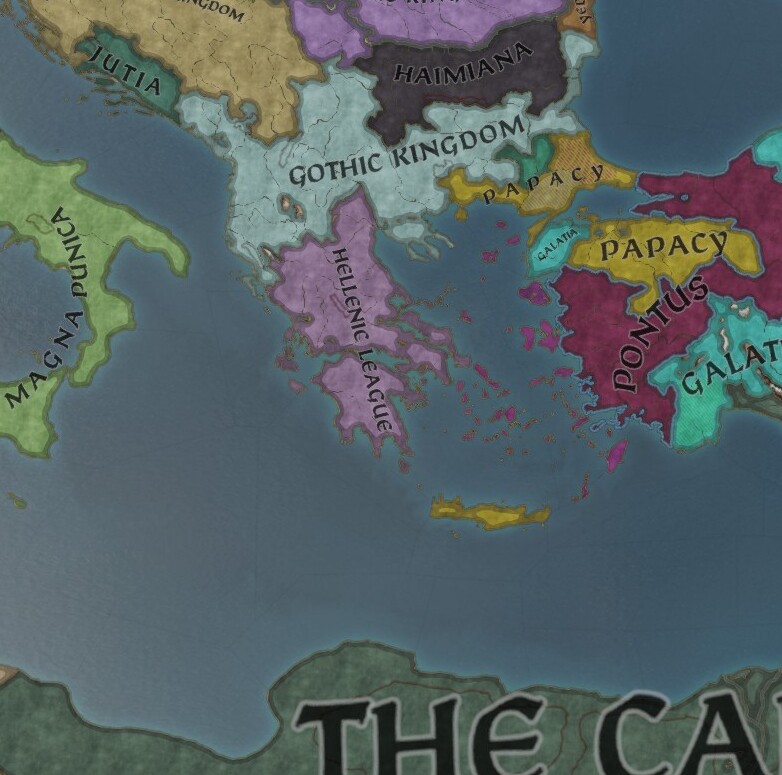 In the wild and boundless forest and steppe of the norths, the Realm of the Huns has reigned supreme since the Dark Ages, but from the early 900s they began facing increased numbers of Turkic peoples pouring out of the east — Kimeks, Pechenegs, Oghuz, Cumans, Tukhsi, Kipchacks, and many other tribal confederations among them. 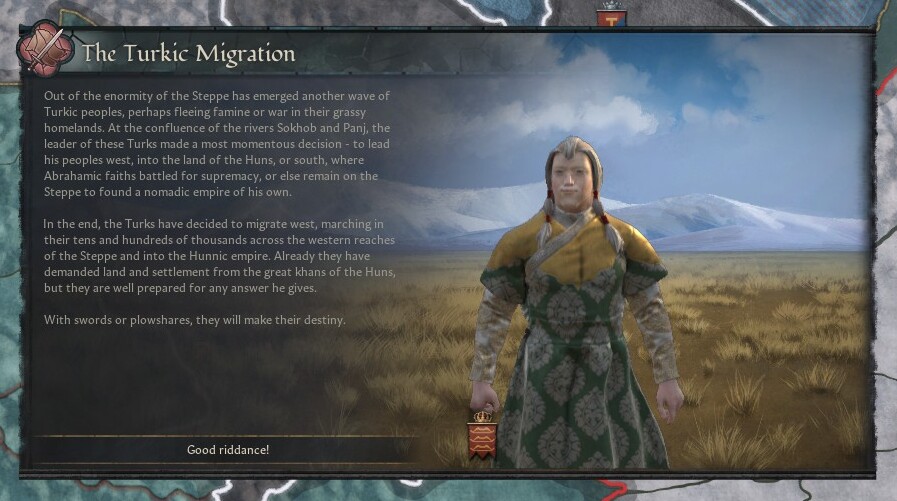 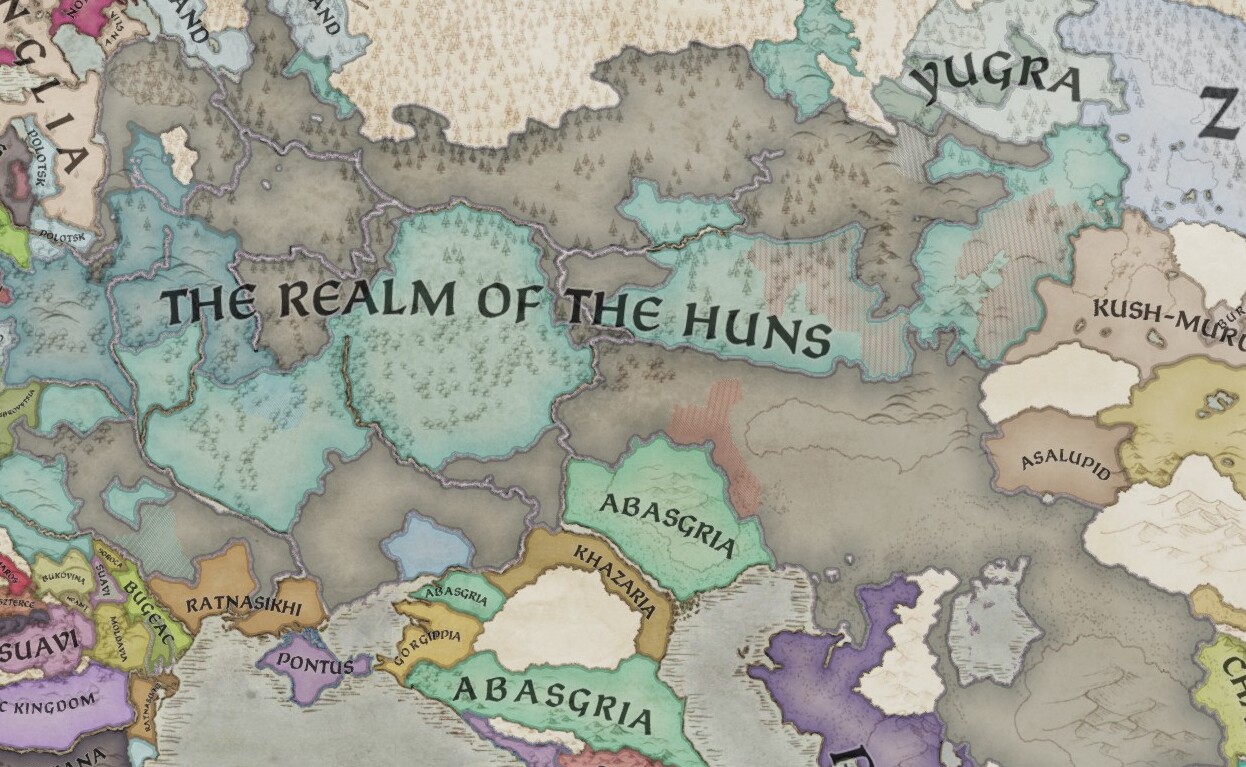 These Turks were initially tolerated and settled within the Hunnic empire… but they have proven to be a fierce and troublesome people, and in a sudden revolt towards the end of the century, they managed to break the Hunnic yoke, puppet the Great Khan, and establish independent realms of their own — the first of many, as they look increasingly westwards for new lands and greater riches. 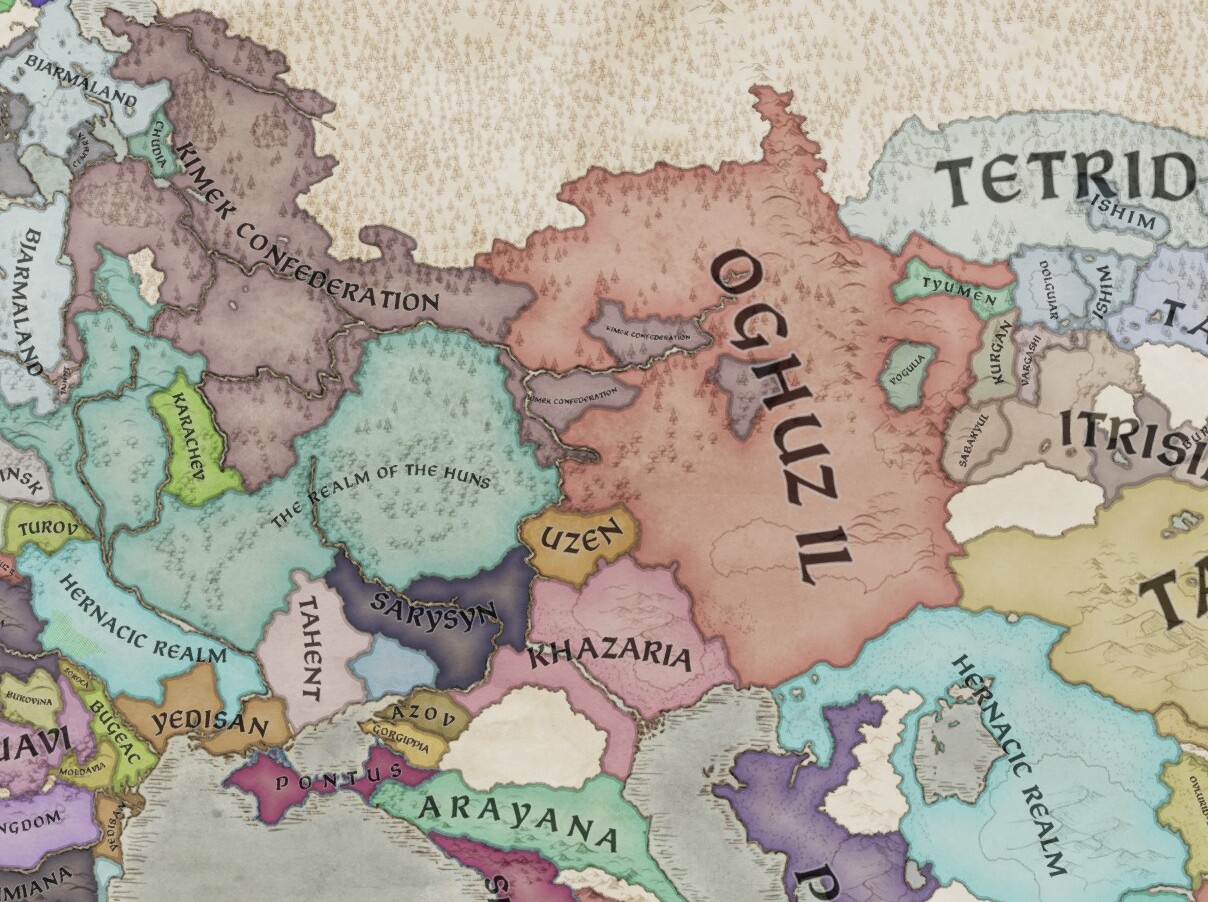 And at the other end of the known world, the immensity of the Indias was almost united by the ancient empire of Mahisamandala… 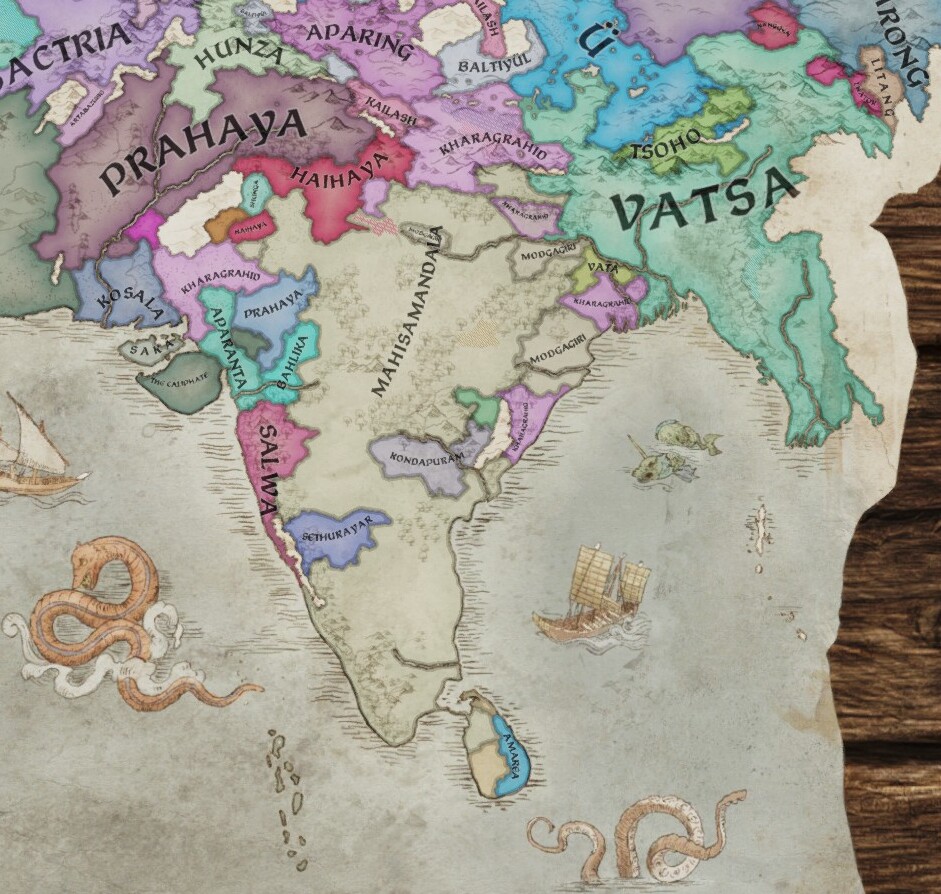 …only for the Christo-Buddhists to collapse in the late 800s, their vast territories divided between Hindu warlord dynasties in the Vatsa (the Chauragaids later emerging as an independent cadet branch) in the north and the Haryanka (of Marathi origins) in the south.  The eastern sects of Christianity still survive along the Indus, where the descendants of the Indo-Greek realm have revived that lost-and-broken kingdom of old. 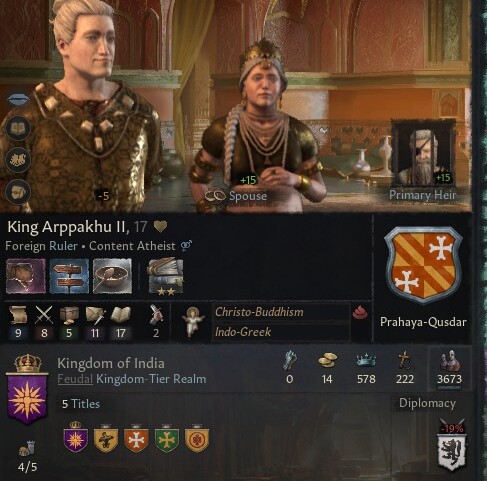 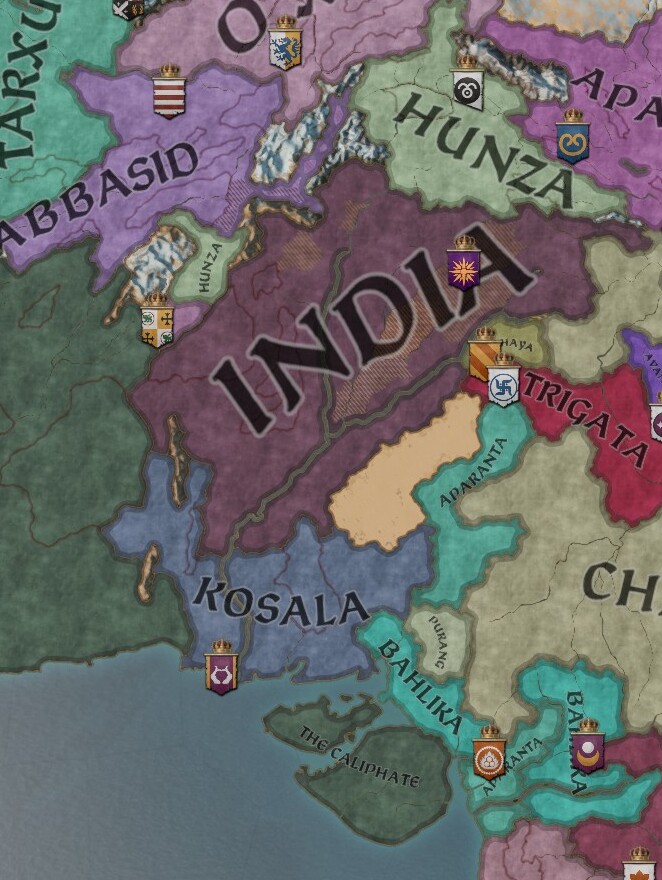 Finally, between east and west is the crux of the world, the heartbeat of the earth, the birthplace of Abraham and spring of all Abrahamic faiths. 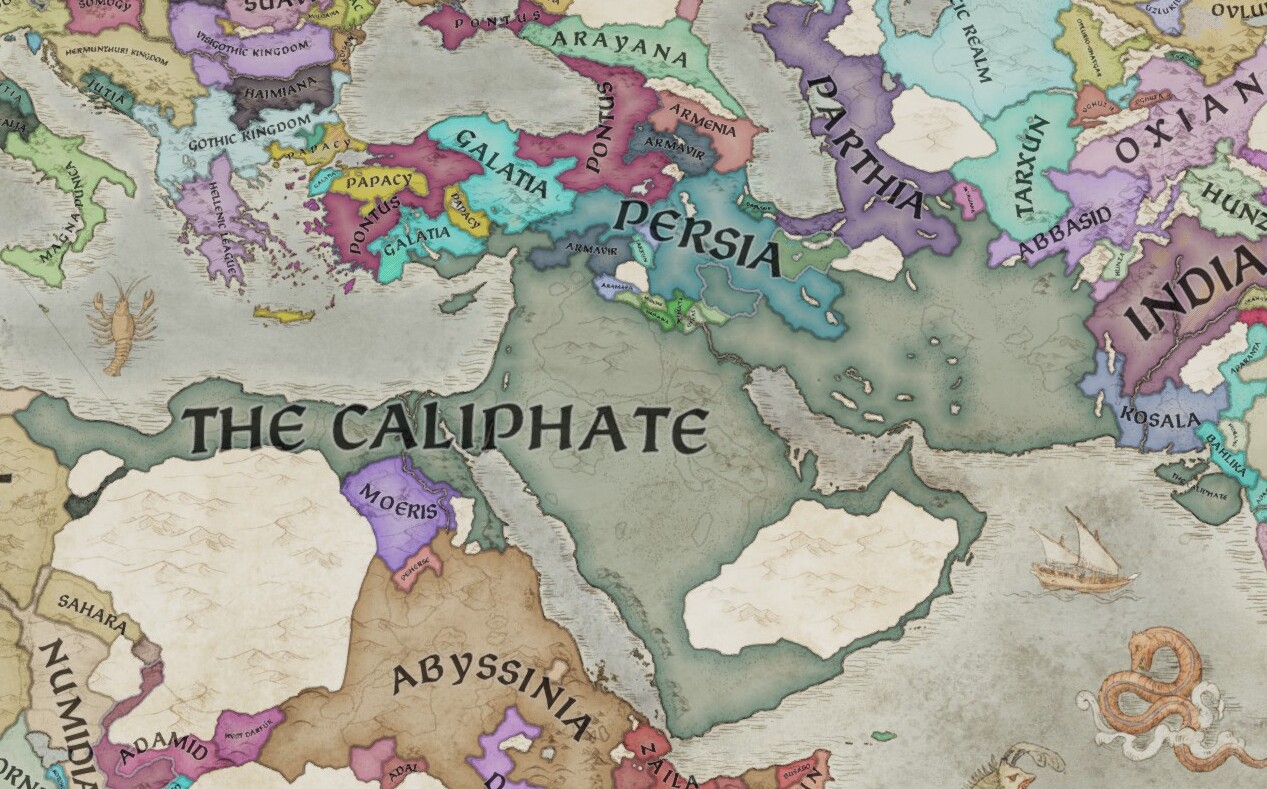 The ascendance of Islam has resulted in the decline of Judaism in the Middle East, but there still Christian forces arrayed against the religion of Muhammad — Persia and Parthia (who follow the Antiochene Church); Pontus and Galatia (who follow the Patristic Church). They have suffered defeat and massacre, loss and bloodshed, but Christendom yet survives. 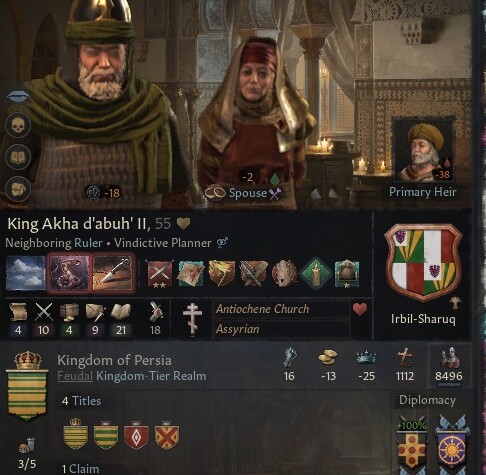 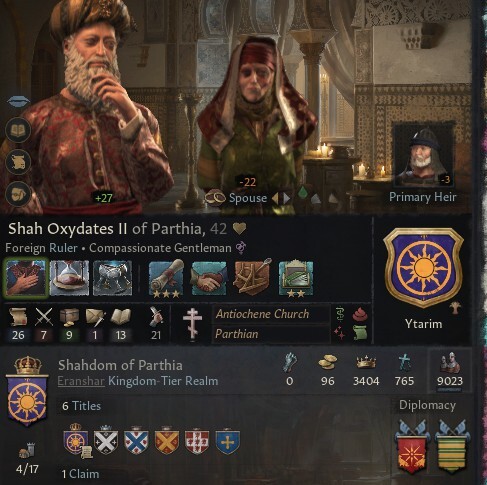 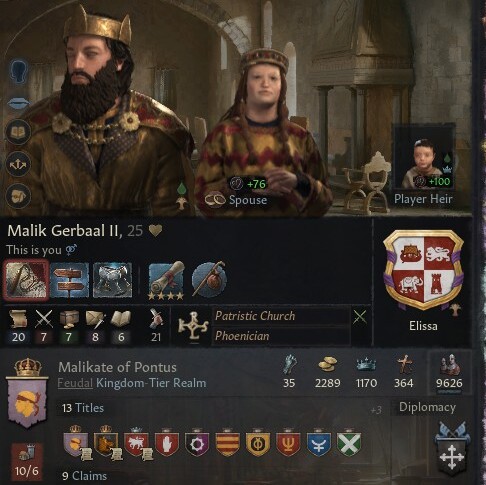 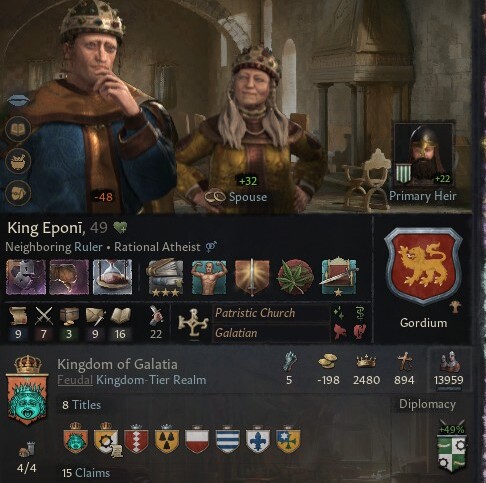 But what hope can they have against all the might of Islamdom? The Caliphate looms large over them, and he has never been vaster, never been wealthier, never been mightier than he is now, on this eve of a new millennium. 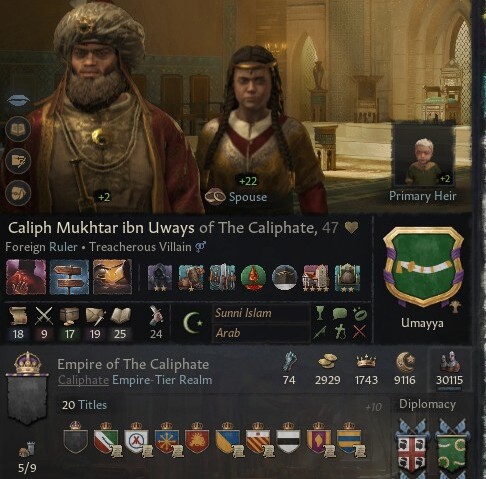 According to some, however, this is little more than a facade. The glory days of the Great Caliph are already gone, the detractors claim, and a rot has begun to set in the decadent courts of Baghdad and Damascus, Fustat and Madinah, with the Caliphs becoming besotted with wine and women, and disinterested in religion and governance — and at the core of it all is a corps of slave-soldiers imported from Anatolia, India and Africa, called Ghilman or Mamluks. 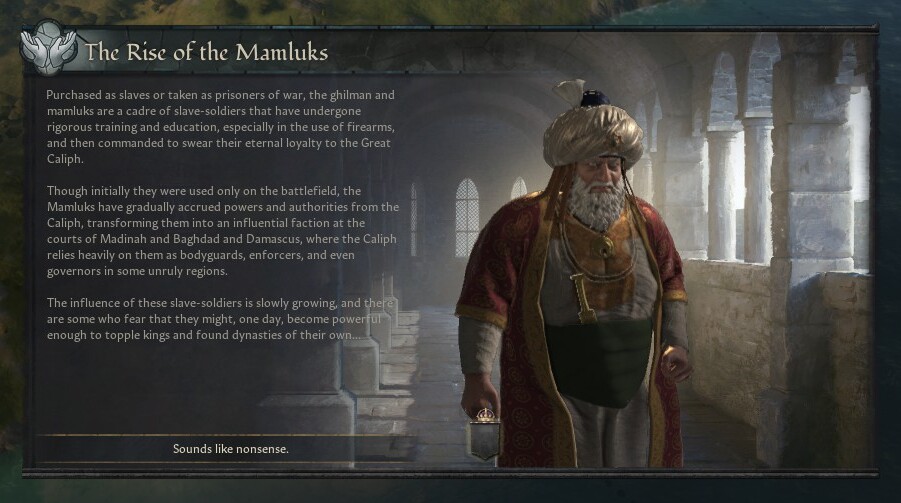 Adding to this is the emergence of a new power along the Furthermost Nile, in the form of Abyssinia, scion of Aksum and Old Kush. The Abyssinians have already raided along the Nile and deep into Egypt, and it cannot be long before they launch a full-out invasion of the Caliphate. 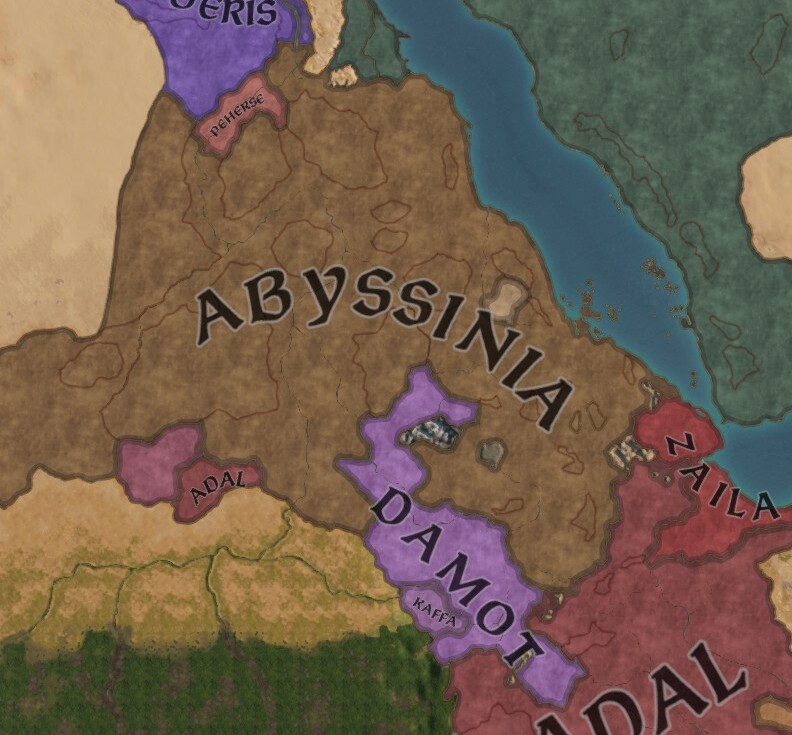 Great conquerors rising on the Steppe, age-old empires collapse in the west and the east as jihads and crusades wrack the Holy Land in between, new technologies are born and ancient sects are extinguished — the medieval era is reaching its pinnacle, and uncertain times lie ahead. ——— World map:  Religion map: 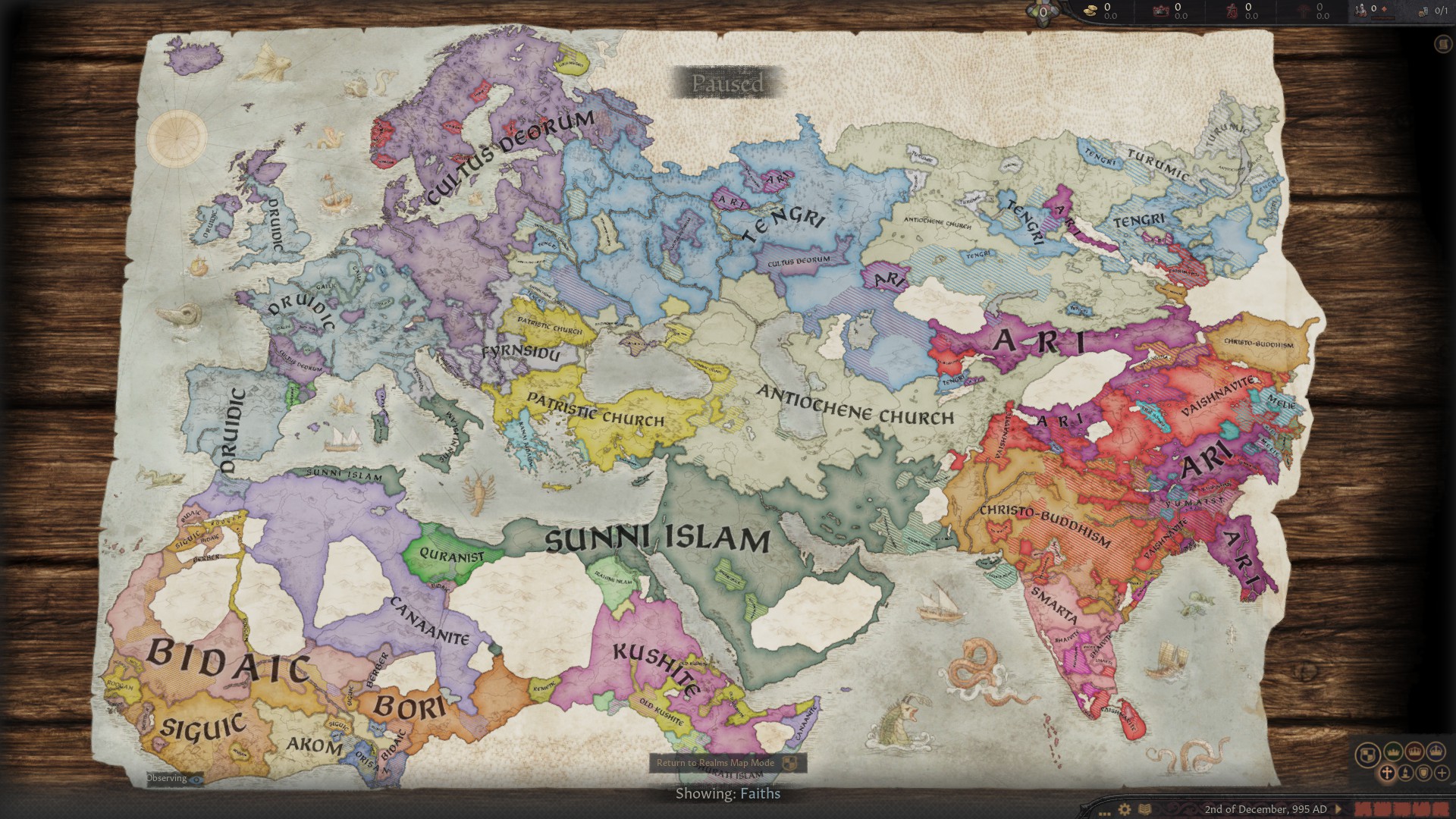 Culture map: 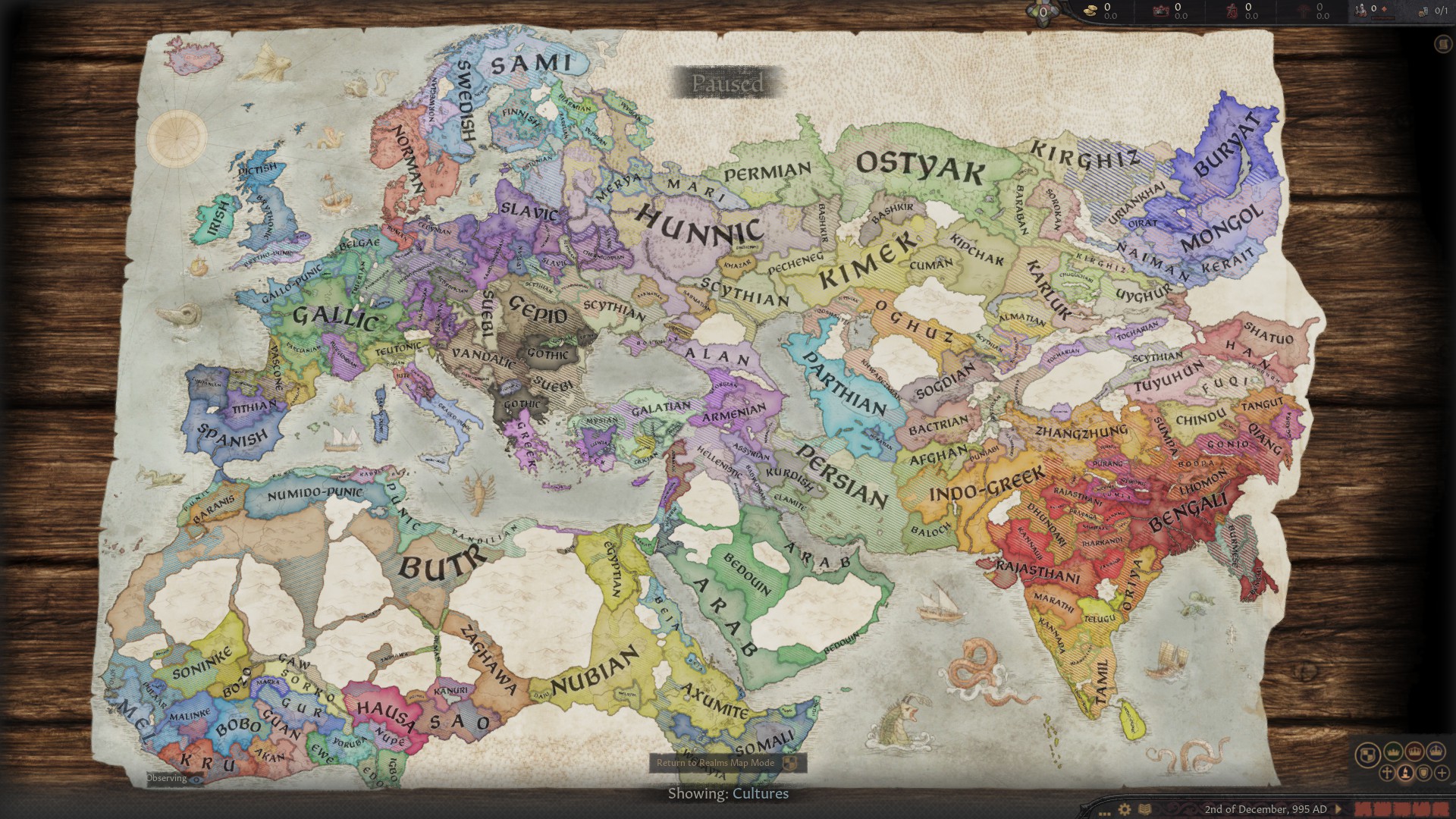
hashashash fucked around with this message at 17:28 on Nov 10, 2023 |
|
|
|
|
I had somehow missed this kicking off for half a year but glad to be here to follow on from the year 1000!
|
|
|
|
down with the caliphate! up with cool countries! long live the hellenic republic!
|
|
|
|

|
|
|
|
Great to see this back! Anatolia could use some prettying up on the border front but has potential! RIP Zoroastrianism. Gauls stronk. Druidic is doing pretty loving fantastic for itself as a major faith, as has cultus deorum. Doesn't look like any abrahamic faith is going to make it much further west. India is my favourite, keep chugging along.
|
|
|
|
What a mess
|
|
|
|
Glad to see this back! Definitely worth the wait.
|
|
|
|
The graphics get fancier, but the bordergore is the same as ever
|
|
|
|
|
Great to see this going on! Yay!
|
|
|
|
Always good to see this mess of a world back in action.
|
|
|
|
Some excellent shattering of nations there. Caliphate next?
|
|
|
|
Has druidic reformed yet?
|
|
|
|
I'm still hoping for a Norman revival.
|
|
|
|
Rooting for Numidia myself. Upholding that Old Time Religion, none of this Abrahamic hocus pocus
|
|
|
|
AJ_Impy posted:Some excellent shattering of nations there. Caliphate next? Right off the bat we need to deal with our Anatolian borders, but yep Caliphate after that -- I've given them some internal instability events as well, so we might see them start to struggle a bit
|
|
|
|
Lord Cyrahzax posted:Has druidic reformed yet? don't think so, i'll double-check later -- but Kushites definitely reformed
|
|
|
|
|
Is 'ARI' on the religons map Ari Buddhism or something else with the same name?
|
|
|
Kanthulhu posted:Is 'ARI' on the religons map Ari Buddhism or something else with the same name? yeah it's ari buddhism
|
|
|
|
Lord Cyrahzax posted:Has druidic reformed yet? also i did double-check, and yeah they are reformed. explains their success i suppose
|
|
|
|
|
hashashash posted:yeah it's ari buddhism The cool sex and booze buddhism. I'm hooting for them over those lame christian-buddhists
|
|
|
|
hashashash posted:Right off the bat we need to deal with our Anatolian borders, but yep Caliphate after that -- I've given them some internal instability events as well, so we might see them start to struggle a bit I take it that's the Mamluk event, is there any Rise of the Shia or Shia caliphate event potentially?
|
|
|
|
hashashash posted:also i did double-check, and yeah they are reformed. explains their success i suppose Any neat doctrines or anything? Reformed continental Druidism with Germanic and Carthaginian elements sounds like a trip
|
|
|
Rejected Fate posted:I take it that's the Mamluk event, is there any Rise of the Shia or Shia caliphate event potentially? there actually was a small Shia state that I gave some events in the beginning of ck3, making it possible for them to topple the Sunnis. unfortunately the caliphate was too strong. there's still an event (adapted from that old ck2 one) that fires every couple generations spawning a shia rebellion, so if the Caliphate hits the rocks they could deffo do somethiing Lord Cyrahzax posted:Any neat doctrines or anything? Reformed continental Druidism with Germanic and Carthaginian elements sounds like a trip their tenets are astrology, sanctity of nature, and reincarnation, so not too bad. weirdly they've enabled incest though, not sure if that's a bug or something they actually managed to do
|
|
|
|
 Part 13 — Papal Schism — 1000 to 1028 Gerbaal II inherited Sardis from his grandmother in the year 993, but it was only a year or so before his grandfather followed her into the grave, and the dual-king immediately moved his court to Trebizond, where he accepted the crown of Pontus as well.   He was known to be well-learned, energetic and sedulous, but even as a youngster there were rumours of a hidden sadistic nature swirling about Gerbaal’s court, rumours that were suppressed by the king himself. Instead, he employed his wealth and prestige to exhibit an air of splendour and majesty —   And as king, Gerbaal immediately took to restructuring his realm’s diplomatic ties with surrounding realms, dissolving formal relations with Galatia and instead aligning himself with Armenia (now constrained within their ‘natural’ borders) and Parthia (a much larger empire that was bitterly rivalled against Persia).     With his new allies in Armenia, Gerbaal undertook annual campaigns into the lesser Hellenistic kingdoms of Armavir and Colossae.   At the same time, the Pontine-Parthian alliance was strengthened with further dynastic matches, as well as plans to launch a joint invasion of Persia.  It was only in late 1004 that these plans came into fruition, however. Persia was distracted by a large rebellion, and so Gerbaal judged it the perfect time to strike, dispatching a 15,000-strong army along the royal road whilst Parthia sailed another 10,000 across the Caspian Sea.   The allies joined forces at Vasburakan, and from there they plunged towards the capital of Persia, besieging Tabriz and Ardabil and Talish in rapid succession.  The sieges were only briefly lifted when a 7000-strong army arrived in relief, but a short and crushing battle followed, and the power of Persia was broken.    The resulting peace treaty divvied up the kingdoms of Persia and Assyria, and ceded the wealthy city of Edessa and its environs to Pontus —  Of course, Edessa lay on the banks of the Euphrates, and just across that river lay all of Islamdom… but this was not the all-righteous, all-conquering, all-victorious Caliphate of old. With the dawn of the eleventh century, the boy who became Caliph was helpless against the growing influence of his slave-soldiers, and in the year 1008, even faced an outright rebellion from the Mamluk governor in Persia.   From further afield, news reached Trebizond that the lord of Magna Punica has proclaimed the revival of Qart Hadasht as ‘Second Carthage’.   And to the north, the Hunnic empire was reduced to a mere rump state, paying tribute to the endless hordes of Turks emerging from the east.  There were opportunities everywhere, but Gerbaal — who was patient, vigilant, and much more methodical than his father had been — was content to wait and watch as these events played out. In the meantime, he decided to quell troubles closer to home…  The kingdom of Galatia, once the premier power in Anatolia, had fallen prey to dynastic infighting and overstrong vassals. With the Anatolian interior ravaged by constant raids, wars and assassinations, Gerbaal decreed that it was high time that peace and order was restored in the kingdom. And in the summer of 1011, he rustled up a distant cousin of his to bear that mantle. Hiempsal possessed a strong claim to the kingdom of Galatia, inherited from his mother Vorvene, a Galatian princess herself.  It was with this piece of paper that Gerbaal staked his casus belli, dispatching a large army of 10,000 into Anatolia with Hiempsal at its head.  The army faced little opposition as they marched on Galatia’s capital at Amaseia. The city was already weakened by years of sieges and counter-sieges and even a sacking, and after just a few weeks of assault by the Pontine army, the skeleton defense was forced to capitulate.  That was not enough to end the fighting, however. After a short respite, Hiempsal took the army further inland, trying to root out the Galatian opposition and force them into a pitched battle. Difficult, but not impossible, as a surprise winter campaign in 1013 finally pinned his foes down and dealt them a devastating blow.    That was enough to win the war, and install Hiempsal as king of Galatia…  But he would not enjoy this newly-won crown for very long, because it was only a few days into his reign that the king was poisoned at his own dining table.   A tragedy, to be sure — and scarcely a year after that untimely demise, the infant sons of Hiempsal were laid to rest alongside him, the first having been stabbed and the second bludgeoned to death.   With his male heirs in their graves, the throne passed to Hiempsal’s daughter, a daughter that was betrothed to none other than Eshmounhilles… the son and heir of Gerbaal, who’d arranged the match several years earlier.  With that, Gerbaal had the entirety of Anatolia under his firm, unrelenting grip. It had taken battles and blood, intrigues and machinations, plots and plots within plots, but after a decade, it was finally done. From the rocky shores of the Bosphorus to the ridged mountains of the Caucasus, the word of Gerbaal II was law. There was no doubting who was behind the conspiracy, of course. Gerbaal was condemned and attainted for regicide, pedicide, familicide — and when the Pope received word of these heinous misdeeds, he had Gerbaal excommunicated as well.   Even so, those brutal killings meant that, one day, Gerbaal’s grandson would inherit the dual crowns of Pontus and Galatia, uniting the whole of Anatolia under one king. A fair exchange, in his opinion. Additionally, through his continuous victories and overbearing diplomacy Gerbaal managed to intimidate the minor lords of Anatolia to swear fealty directly to him —     To ensure that his hardwon conquests were not divvied up between his many children, Gerbaal summoned his vassals to Trebizond and forced them to swear acquiescence to his new laws of inheritance — agnatic-cognatic Primogeniture, which dictated that the eldest son would inherit everything.  And to further cement his dominance over the vast region, Gerbaal began introducing Galatian customs and traditions to his court. They quickly caught on, leading to a blossoming of culture that would later be called the Galato-Phoenician period.   This period would be characterised by ostentatious fashions being taken up by the king, luxurious foods and lodgings served at court, amenities and artifacts being funded from the royal treasury —    Whilst the kingdom of Pontus prospered, the Caliphate was bogged down in a failing war against his own slaves. Gerbaal had spies in the south, of course, and their whispers reached him from all corners of Islamdom — not only had the mamluks of Persia broken away and bestowed with the title of ‘Sultan’, but the Vandalic lord of Kyrenaica had invaded and stolen the province of Egypt as well.    The Caliphate was roiling with unrest and instability, and the time was ripe for Christian intervention. Gerbaal was determined to lead such an effort, and so he tried to seek conciliation with the Pope. But the Holy Father refused to retract his excommunication, repeating his tired tirades against Gerbaal — kinslayer, kingslayer, warmonger etc. Quite ironic, considering the Papacy had just concluded on his own bloody conquest of Greece.  Nevertheless, the Papacy and Patristic Church as a whole was in an unusual position, because it had been founded on the belief that the Holy Land had to be reconquered before the Day of Judgement arrived at the turn of the millennium… but the year 1000 had begun and ended without the resurrection of the dead, or the second deluge, or the toppling of the skies and scourging of the flesh, or any of the other calamities promised by Patristic priests. And in this, Gerbaal found some room to maneuver. He convened a synod of Pontine bishops to tackle this issue and others — a direct challenge to Pope-in-Byzantion, who was no consulted in any capacity.    The Pope denounced and double-excommunicated King Gerbaal, calling on all righteous Christians to take up arms against the ‘antichrist in Trebizond’. Gerbaal retaliated by accusing him of being an ‘anti-pope’ and ‘false father’, and declared war on his Papacy.  The campaign was short and decisive. After dispatching Papal armies at the battle of Aeolis and then again at Kallipolis, Gerbaal’s armies besieged Byzantion — which promptly opened its gates to Gerbaal’s conquering forces.    The anti-pope was nowhere to be found, however, and the populace soon revealed that he had already fled, and taken up residence on the isle of Crete.   Frustrated, but pleased by the largely-bloodless conquest of the Holy City, Gerbaal installed his own favoured candidate to the Papacy —    Of course, this new Pope immediately lifted the excommunication and lavished titles and honours aplenty on him — not only was Gerbaal confirmed as king of Pontus and Sardis, but he was proclaimed Over-king of Anatolia and Asia Minora (reviving the ancient tradition of Great King and Megas Basileus), protector of Phasis and Tarawn and Hatti and Atillaia and Phrygia (the many nations of the peninsula), and sword-and-shield of Christendom. All of these titles and territories would informally be labelled the Elissid Crown, reflecting the many personal unions led by the head of the Elissid dynasty.    And in that same ceremony, the Pope declared that this new era for Church and Christendom would be inaugurated by the first large-scale counter-offensive against the Caliphate and Islamdom — the Crusade.   Thus, king and pope dispatched a dozen dozen messengers and missionaries to carry word of this crusade all across Christendom, with the objective being nothing less than invasion of the Caliphate and seizure of the City of Cities, Holy of Holies, Sacred Jerusalem. And whilst word of this ambitious venture spread quickly and the foremost knights and lords flocked to Trebizon to take the cross, so did hundreds and then thousands of peasants, filthy and fetid, all desperate to see Holy Jerusalem with their own eyes. Unfortunately, in all the commotion, there was also ample opportunity for Gerbaal’s enemies to slip into Trebizond as well — and one such individual did so in late 1028, getting close enough to the king to slip him a deadly poison!  Gerbaal managed to survive this assassination attempt, foiling the attempt on his life… Or so he thought, but in the next few days his condition deteriorated further and further until he was forced abed, wheezing and coughing blood.   Gerbaal was not given the mercy of a quick death. He lingered for several weeks in excruciating pain, stinking his sheets with the death-scents of black humors and infection, losing his mind for hours at a time, rambling and bleeding and seizing away. Divine retribution for his many sins, perhaps. But finally, just before the new year of 1029 was born, Gerbaal II was released from his torments and allowed to die.  He was not a pleasant man, that much is certain, but Gerbaal was a dynamic figure of great action and greater accomplishment, building upon the foundations set down by his father and then exceeding them. For that, he would be remembered in family histories and foreign records alike as Gerbaal the Glorious. hashashash fucked around with this message at 17:28 on Nov 10, 2023 |
|
|
|
|
They gonna make many a historic drama about Gerbaal. Also by becoming pseudo-Byzantium, have we done the unthinkable and become ourselves a Rome?
|
|
|
Rejected Fate posted:They gonna make many a historic drama about Gerbaal. gently caress, it's like Carcinization but for nation-states, it all eventually degenerates into a Rome
|
|
|
|
|
the papacy deserved it for what they did to greece
|
|
|
|
What a way for a cruel and conniving man to go. But he accomplished his life's goals. Now to see if his descendents kruk it up or not!
|
|
|
|
Rejected Fate posted:They gonna make many a historic drama about Gerbaal. 
|
|
|
|
Free Greece What would better prove our new guy's benevolence to all the world (versus grandad's not so benevolent nature) than liberating the occupied Republic of old instead of annexing it?
|
|
|
wedgekree posted:What a way for a cruel and conniving man to go. But he accomplished his life's goals. welp the new king is a drunken sot, so they're not off to a great start, especially since there's a crusade about to fire
|
|
|
|
|
Aw man, I was hoping we'd convert back to Judaism. 
|
|
|
|

|
| # ? May 24, 2024 07:35 |
|
Gotta hand it to a guy who gets excommunicated and responds with "No, Holy Father, it is you who is excommunicated."
|
|
|






